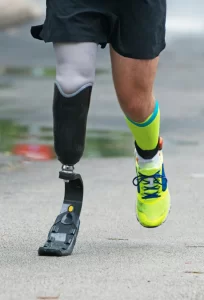Ogden Tables for Personal Injury Compensation

Contact
Table of Contents
What are the Ogden Tables?
The Ogden Tables are a set of guidelines used by personal injury solicitors to calculate how much compensation a claimant should receive. Solicitors, insurance companies and the courts use them to figure out how much compensation should be paid to people who have suffered injuries. The tables were first published in 2007 by the UK government and are updated every few years. The latest version (version 8) of the Ogden Tables was published in 2020.
Why do solicitors need the Ogden Tables?
Personal injury claims exist to help put an injured person’s life back to where it was before the accident happened. As such, the compensation amount will differ from person to person. For example, a 26-year-old who can no longer work due to a serious injury can expect to receive a higher lump sum for loss of earnings than a 60-year-old who suffered the same injuries, since the younger person is so much further from retirement.
The value of money changes over time. When negotiating compensation, solicitors are careful to ensure that a lump sum payment agreed today will be enough to cover future costs, such as earnings the injured person will miss out on and the personal and medical care they may need for the rest of their life. The Ogden tables are an aid for solicitors to help them calculate the right lump-sum amount.
How do the Ogden tables work?
The tables use statistical methods to assess risk and estimate future payments. These principles rely on life expectancy data and discount rates to calculate the present value of future economic losses.
The Ogden Tables work by taking into account the following factors:
- The severity of the injury
- The age of the claimant
- Whether or not the claimant has suffered any financial losses as a result of the accident.
For each of these factors, there is a corresponding amount of compensation that the claimant may receive. For example, suppose the claimant is a 50-year-old woman with a normal life expectancy who will need care costs of £10,000 a year for the rest of her life. According to Ogden Table 2, which covers care costs for women with normal life expectancy, the claim would be worth £390,900.
Can I use the Ogden Tables to calculate my own compensation claim?
No, the Ogden Tables are only to be used by solicitors. If you try to calculate your own compensation claim using the Ogden Tables, you may not receive the full amount of compensation that you are entitled to. It is always best to speak to a personal injury solicitor who can help you calculate your claim.
Lump-sum vs periodical payments
The various heads of damages relating to future losses may be sought either as a one-off lump sum or by way of periodical payments which are annual payments of the head of loss paid until the Claimant dies or for other agreed fixed periods of time. For example, future private care costs will be paid at an initial agreed annual sum which is then increased by an inflationary index to take into account the increase in care costs generally.
There are advantages and disadvantages to both and it is important that proper advice is sought before committing to either of the options available. Every Claimant’s circumstances are different and usually, an Independent Financial Advisor’s report will be sought to advise on what will meet the Claimant’s needs.
The Court is obliged to consider periodical payments as a form of award for future financial loss. Various conditions must be met for the Court to order these.
Lump-sum compensation payments are calculated by multiplying two numbers:
- Multiplicand – the annual loss the claimant is expected to suffer, at today’s rate
- Multiplier – a figure determined by applying the discount rate.
This means that when a personal injury claimant accepts a lump sum compensation payment, the final figure is adjusted for the “discount rate.” The discount rate reduces the amount of compensation that a claimant will receive. This is to reflect the fact that the lump sum will be spread over many years, and the claimant is likely to earn interest by investing the money before they spend it.
What are the advantages of lump sum payments?
The advantage of a lump sum for a Claimant is that the Claimant can spend the lump sum whatever he or she wishes and can pass it on to their Estate when they die. It gives a Claimant total flexibility with their damages.
The advantage of a lump sum for a Defendant is that once it is paid, the Defendant is free from any future responsibilities to the litigant. The insurer can “close their file” upon payment.
What is the discount rate?
The discount rate is used to convert future financial needs into a present value. It reflects the return that could be expected if the lump sum were invested. The idea is that a pound paid in the future is worth less than a pound today because of the potential earning capacity of money (i.e., interest rates). The lower the discount rate, the higher the present value of future costs, because it assumes lower earnings from investments.
The personal injury discount rate is set by the UK government and is applied through the Ogden tables. The current discount rate is minus 0.25%.
Here’s an example. Suppose an injured person has to take a different job because of her injuries and her yearly salary decreases by £8,000. The multiplicand is £8,000.
The solicitor would then locate the appropriate multiplier in the Ogden tables. The tables cover scenarios for men and women at different current ages and different retirement ages, so it’s a matter of selecting the right multiplier from the list.
Multiplying the two numbers together should produce a lump sum amount which, if invested, will be equivalent to £8,000 per annum (in this example) until the claimant’s pension age.
Recent changes and updates
The latest tables contain a number of updates to make them more accurate including:
- Updated mortality assumptions and they cover a wider range of retirement ages, reflecting changes in life expectancy and retirement planning.
- They now include 36 tables, an increase from 28 in the previous edition. These new tables account for earnings multipliers up to the age of 80 (previously 75) and reflect the increasing state pension age in the UK.
- The notes have been rewritten to include guidance on pension loss claims and periodical payment orders.
- More detailed guidance on the impact of disability on employment, reclassifying categories of educational attainment, and the calculation of pension and fatal accident claims.
Examples of use of the Ogden tables:
Personal Injury Claim
In a case involving a young professional who suffered permanent injuries in a car accident, the Ogden Tables were used to calculate future loss of earnings. The individual, who was in their early 30s and had a promising career ahead, was left unable to work in the same capacity as before.
The court used the Ogden Tables to determine the loss of future earnings by considering the claimant’s age, salary prior to the accident, and their likely age of retirement. A multiplier was applied to the annual loss to calculate the present value of the lifetime earnings lost due to the injury.
Fatal Accident Claim
In a tragic case, a family filed a claim after the primary breadwinner died in an industrial accident. The claim was made to secure financial support for his wife and children.
The Ogden Tables were used to calculate the dependency claim, estimating the financial support the deceased would have provided to the family until retirement. The tables helped determine an appropriate multiplier to apply to the annual support figure, considering the deceased’s age, expected years of work remaining, and the needs of the dependents.
Long-Term Care Needs
A severe medical negligence case resulted in a patient suffering from long-term disabilities requiring lifelong care. The compensation needed to cover medical expenses, personal care, and special accommodations in their home.
The Ogden Tables helped calculate the cost of future care by estimating the annual cost and applying a multiplier based on the life expectancy of the injured person. This approach ensured that the compensation covered the full extent of the care required, adjusted for inflation and discounted for present value.
Reduced Life Expectancy
An individual was exposed to harmful substances at work, leading to a respiratory disease that significantly reduced their life expectancy. The compensation claim included considerations for lost quality of life and earnings.
The Ogden Tables were instrumental in adjusting the usual calculations to account for the reduced life expectancy. The legal team used specific tables that consider shorter life spans to calculate a fair compensation for both the emotional damages and the financial impact of early death.
How Osbornes Law can help
If you’ve been affected by an accident and believe you’re entitled to compensation, we can help you understand how the Ogden Tables can influence your claim. Contact us and get help from one of our personal injury solicitors.
- Fill in our online enquiry form; or
- Call us on 020 7485 8811
Share this article
Definitions
Multipliers and Multiplicands Law
When Courts are required to calculate damages for example for future loss of earnings, the calculation can only ever be based on hypothetical future conditions. The primary aim of any calculation is therefore to produce a monetary figure which represents the actual future loss. To a certain extent, this means crystal ball gazing regarding a Claimant’s future career.
Multiplicands
Any future loss of earnings award should take into account any future promotions, pay raises, and bonuses and should be calculated up to the Claimant’s anticipated normal retirement age. A multiplicand is an annual figure for loss which is multiplied by the “multiplier “ which represents the number of years of future loss to be claimed. Losses can be claimed to various ages of a Claimant eg. To various retirement ages or for the expected duration of the Claimant’s life expectancy.
Multipliers
For years, multipliers in the UK were generally based on the multipliers used in comparable cases. This situation changed when the book, Actuarial Tables with Explanatory Notes for Use in Personal Injury and Fatal Accident Cases was published in 1984. The book of tables was compiled by a group of lawyers and actuaries who were working in victim compensation, a group which was headed by Sir Michael Ogden Q.C. The publication became known as The Ogden Tables and is currently used by actuaries and lawyers to calculate the lump sum which must be paid in compensation in the case of personal injury or death.
Contact us today
Call us 020 7485 8811
Email us Send us an email and we’ll get back to you
Osbornes clients are individuals whose cases are treated with the focus required when dealing with life changing injuries.
Fielding a ‘first class, very well resourced’ team of litigators, the personal injury department at Osbornes is rated for its diverse workload of complex, high-value injury claims, representing both domestic and international claimants.
Osbornes is an excellent firm, made up of lawyers with flair and pedigree.
Osbornes lawyers are smart, well trained, experienced and well managed.
Osbornes personal injury practice is first class; very well resourced and second to none.
Osbornes is becoming one of the top players in the claimant personal injury market. A large team with a great number of very high quality solicitors.
Osbornes is a highly proficient serious injury firm. They bring all the benefits of the biggest firms in the market but none of the downsides.
More from RobVIEW ALL
- 19.6.2022
Car accident client stories
Below is a summary of the car accident claims that the personal injury specialists in the personal injury claims department...
Read more - 5.11.2021
Seven figure leg amputation settlement
Workplace accident results in life-changing injury When our client (Mr S) suffered a devastating crush injury at work that led...
Read more - 26.10.2021
Examples of Serious Head & Brain Injury Settlements
C–v-N Child pedestrian crossing road knocked over by car when running into road sustaining a traumatic brain injury and...
Read more - 6.10.2021
Multi-Million Settlement After Motorbike Accident
£5m settlement for injured motorcyclist Our lawyers achieved a £5m settlement for a 54-year-old man following a motorbike accident. As...
Read more - 9.8.2021
Motorcycle Accident Case Settles for £400,000
The accident causes serious injuries Mr C, an Italian man working in a 5 star London hotel was riding a moped...
Read more - 9.8.2021
Motorcycle accident case settles for £90,000
Our client’s journey from devastating accident to settlement Mr H was a hard-working security operative. He and his wife...
Read more - 2.8.2021
London Tube Sign Causes Head Injury: Case Study
Compensation for Pedestrian Injured by Falling Public Sign Brain Injury Claim after falling tube sign knocks pedestrian unconscious Incident Overview...
Read more - 15.2.2021
Death due to fishing accident settled for £125,000
Client drowns following a boat collision Fatal Accident claim following the death of Mr D who drowned as a result...
Read more - 21.9.2020
Motorcyclists – Could your actions be invalidating your insurance?
Insurance cover for you and your bike is vital in the event of an accident or theft but beware – insurance...
Read more - 20.6.2019
Brachial Plexus Injury
In my career I have worked for the two biggest motorcycle insurance brokers in the UK and assisted their policyholders...
Read more




















